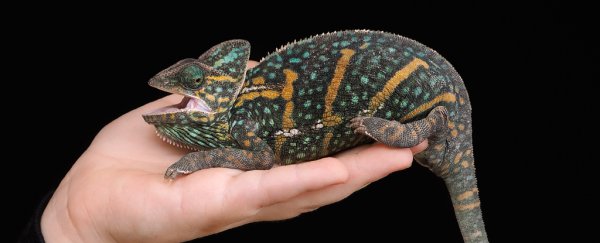Rhinos, tigers, pangolins – we're used to hearing about the mammals that are snatched from the wild so that their body parts can be sold. But did you know that you can buy and sell 36 percent of all known reptile species over the internet?
That's more than one in three species, including the endangered speckled tortoise (the world's smallest species of tortoise) and the Seychelles tiger chameleon.
Reptiles are consistently overlooked by trade regulations. The Convention on International Trade in Endangered Species of Wild Fauna and Flora (CITES) is the world's mechanism for protecting wildlife in global markets.
This global agreement is supposed to regulate the trade of species to prevent them being overexploited, but a new study has revealed that more than 75 percent of reptiles traded online are species that are not covered by CITES. And as the online trade has grown, even reptiles protected by CITES are being taken from their natural habitats and sold to buyers around the world.
Reptiles are mostly traded for two reasons. In the fashion industry, their skins are made into leather. Reptile skins are what CITES mostly records, as this trade happens on a commercial scale. Thousands of skins of crocodiles, in particular, but lizards and snakes too, are shipped around the world to make boots, purses, and watch straps among other things.
Much less well documented, according to the new study, which I have also found in my own research, is the smaller scale trade in individual reptiles for "personal" use, like the pet trade.
 Many are flown thousands of miles to be mistreated. (reggie35/Flickr/CC BY-SA 2.0)
Many are flown thousands of miles to be mistreated. (reggie35/Flickr/CC BY-SA 2.0)
Scaling back the trade
At first, it may not seem that the sale of one reptile here and there presents a problem. But the wildlife trade is a global phenomenon.
The tens, if not hundreds of thousands of individual sales of reptiles taking place around the world every year add up. The result is that small populations of reptiles – some of which only live in one particular place – are threatened with extinction.
The demand for rare and unique companion animals helps fuel this.
Farming reptiles, or breeding them in captivity, is often touted as a solution, but this approach has its own problems.
Captive breeding has been a source of illegal activity in the past. Businesses that were supposedly breeding reptiles in large quantities to meet demand were found to likely have been taking them from the wild instead.
This kind of laundering is difficult to control unless there are robust practices in place to trace reptiles all the way from source to final purchase.
Captive breeding in the reptile trade also has horrible consequences for animal welfare. As colleagues and I have argued, the reptile leather industry is extraordinarily cruel. Animals are often kept in unhygienic conditions and slaughter is usually done while the reptile is conscious. That means many animals are skinned while still alive.
The pet industry is little better. Reptiles are crammed into small boxes and flown as cargo all over the world, enduring days without food and water and in fluctuating temperatures. There is no guarantee that they will be better kept once they arrive at their new home.
The biggest demand for pet reptiles is in Europe and North America. This is an important and often overlooked point: advertising the harm that the exotic pet trade causes could help reduce demand where it is greatest.
The new research illuminates some of the areas where our understanding is most limited. We known that many reptiles are sold as ingredients in medicines for example, but we know almost nothing about the scale of this trade.
This requires investigation, as does the role of social media – including Facebook and WhatsApp – in supporting the buying and selling of reptiles and other wildlife.
The new study also raises an alternative to the way the wildlife trade is currently regulated. What if no trade was the default starting point?
Trade would only take place if there was sufficient evidence to show that it would not harm the survival of the species. This precautionary approach would address the lack of data for many species and also potentially simplify customs checks.
It's time to rethink how this trade is regulated, and our relationship to wildlife altogether. ![]()
Tanya Wyatt, Professor of Criminology, Northumbria University, Newcastle.
This article is republished from The Conversation under a Creative Commons license. Read the original article.
